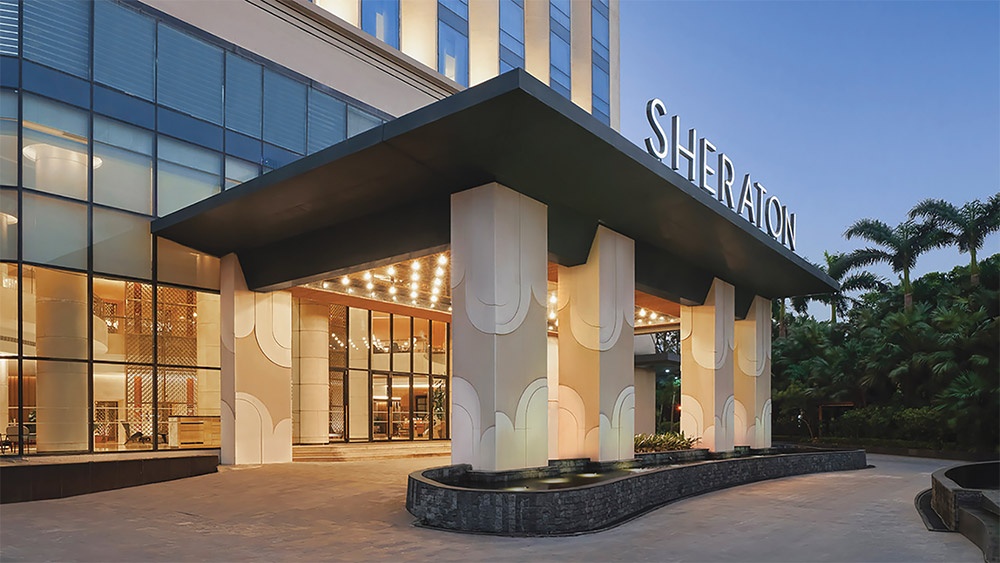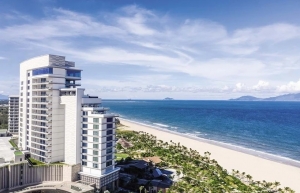Exciting brands to revamp hotel and resort prospects
In the first seven months of 2024, Vietnam’s tourism industry has seen a notable rebound, welcoming over 10 million international visitors. This marks a 51 per cent increase compared to the same period in 2023 and a 1.9 per cent rise compared to 2019.
 |
| By 2025, Marriott International plans to expand in Vietnam with 50 new hotels or resorts |
South Korea remains Vietnam’s largest source of tourists, contributing nearly 2.6 million arrivals, which represents 26 per cent of the total. China follows with 2.1 million visits, accounting for 21.4 per cent. These two markets together account for nearly half of Vietnam’s international visitors.
Despite this resurgence, Vietnam’s hotel industry is still grappling with challenges. Room rates at domestic destinations have nearly returned to pre-pandemic levels. While some hotels in Ho Chi Minh City and Hanoi have seen improvements in room rates, overall growth in room prices trails other regional countries.
The slow recovery of traditional tourist markets such as Russia and China, coupled with a surge in hotel supply in coastal destinations, affects room occupancy rates.
According to Savills Hotels, approximately 45,000 rooms in the mid-to-high-end segment have been added from 2020 to June 2024, marking a 25 per cent increase in supply.
Mauro Gasparotti, director of Savills Hotels, highlighted that although demand recovery is nearly complete, the market faces challenges including oversupply in some areas due to large-scale projects and undersupply in places like Ho Chi Minh City. He emphasised the need for new and improved products to remain competitive regionally.
“Many developers seized opportunities during the tourism boom but often overlooked comprehensive project planning. This has led to an overreliance on tourism growth rather than aligning with market demand. Consequently, some coastal condotel properties are struggling and have stalled,” Gasparotti explained.
He also noted that a trend towards rebranding and repositioning is emerging, with hotels and condotels enhancing their competitiveness through brand updates, upgraded food and beverage offerings, and other strategic adjustments.
Branded introductions
| " We are on track to more double our presence of Hilton Garden Inn properties in Vietnam in the coming years."‑ Jenny Milos VP of Focused Service and All Suites Brand Management, Asia-Pacific Hilton |
Despite the hurdles, the number of branded hotel projects in Vietnam continues to grow. Over the next three years, international hotel brands are expected to account for 40 per cent of all mid-range and high-end projects in the country, up from 25 per cent in 2013.
For example, by the end of 2024, Marriott International plans to expand its footprint in Vietnam with 50 new hotel and resort projects. This expansion includes new domestic brands, such as The Westin Resort & Spa Cam Ranh, launched in June.
Upcoming brands include The Ritz-Carlton and Marriott Executive Apartments. The Ritz-Carlton, a luxury line within Marriott International, operates in fewer than 10 locations globally.
IHG Hotels & Resorts has surpassed 1,000 hotels in Asia-Pacific and continues to introduce new brands like Holiday Inn Hotels & Resorts, Regent Hotels & Resorts, Hotel Indigo, Vignette Collection, and voco hotels in the region.
Paul Cunningham, senior operations director for Southeast Asia and South Korea at IHG, attributed the company’s growth in Vietnam to a positive travel outlook, strong domestic demand, and increasing international interest, particularly from Asia’s growing middle-class and expanding GDP.
“With new flight routes from major cities like New Delhi, Manila, Sydney, and Munich, we are optimistic about our growth prospects in Vietnam,” said IHG’s statement to introduce Hotel Indigo Saigon and Vignette Collection in Hoi An town in the south-central province of Quang Nam province, in May.
Currently, IHG operates 18 hotels across six brands in Vietnam and plans to more than double its portfolio by 2028 with at least 26 additional hotels.
In the coming time, the recovery of the Chinese market, along with visa and tourism stimulus programmes, is expected to continue to accelerate the recovery of tourism activities. “The market needs to be more diverse in terms of tourism products and service quality, to meet the needs of tourists and public officials. This requires cooperation between localities, businesses, and individuals in the industry to create more value for tourism products, thereby increasing the tourism industry’s position on the international tourism map,” Gasparotti added.
Ideal conditions
Looking ahead, Vietnam’s hotel industry is expected to be shaped by several emerging trends. One significant trend is the rise of lifestyle brands with a strong focus on food and beverage services.
A prime example is Nobu Hospitality, which has chosen Vietnam as its first Southeast Asian destination with high-end projects in Ho Chi Minh City and Danang. Trevor Horwell, CEO of Nobu Hospitality, highlighted Vietnam’s market potential, noting its ideal conditions for comprehensive tourism services.
“The number of tourists from all over the world coming here every year is an ideal condition to exploit comprehensive tourism services, which is also the model Nobu is pursuing. Compared to South Korea or Thailand, two countries that have strongly developed service industries in Asia, Vietnam is considered a market with abundant development potential,” Horwell said in Ho Chi Minh City during the visit of three Nobu leaders in June.
Another trend is the growing popularity of the focused service hotel model, which offers basic services and relies on local amenities for dining and entertainment. This model is present in Ho Chi Minh City, Nha Trang, Danang, and other locations, though still limited compared to regional counterparts.
Hilton Garden Inn, a focused service brand, has experienced significant growth in Asia-Pacific due to its efficient prototype and flexible offerings. Jenny Milos, VP of Focused Service and All Suites Brand Management for Asia-Pacific at Hilton, noted strong interest from owners in this brand’s potential for growth in Vietnam.
“There is significant interest from owners in the brand, driven by its efficient prototype, tailored offerings, and flexible agreement options, positioning it as a substantial accelerator of our growth within Asia-Pacific. We are on track to more double our presence of Hilton Garden Inn properties in Vietnam in the coming years,” said Milos.
According to Savills Hotels, the number of focused service hotels in the mid-range segment managed by top international operators in Vietnam is currently one-third of that in Thailand. With its diverse tourist base and ample culinary and entertainment amenities, this model is expected to gain traction in Ho Chi Minh City, similar to Bangkok.
 | Vietnam resort properties attractive to foreign investors Foreign investors are buying into the Vietnamese resort and hotel realty market, lured by the prospect of a full market recovery, according to experts. |
What the stars mean:
★ Poor ★ ★ Promising ★★★ Good ★★★★ Very good ★★★★★ Exceptional
Related Contents
Latest News
More News
- An Phat 5 Industrial Park targets ESG-driven investors in Hai Phong (January 26, 2026 | 08:30)
- Decree opens incentives for green urban development (January 24, 2026 | 11:18)
- Public investment is reshaping real estate’s role in Vietnam (January 21, 2026 | 10:04)
- Ho Chi Minh City seeks investor to revive Binh Quoi–Thanh Da project (January 19, 2026 | 11:58)
- Sun Group launches construction of Rach Chiec sports complex (January 16, 2026 | 16:17)
- CEO Group breaks ground on first industrial park in Haiphong Free Trade Zone (January 15, 2026 | 15:47)
- BRIGHTPARK Entertainment Complex opens in Ninh Binh (January 12, 2026 | 14:27)
- Ho Chi Minh City's industrial parks top $5.3 billion investment in 2025 (January 06, 2026 | 08:38)
- Why Vietnam must build a global strategy for its construction industry (December 31, 2025 | 18:57)
- Housing operations must be effective (December 29, 2025 | 10:00)

 Tag:
Tag:


















 Mobile Version
Mobile Version